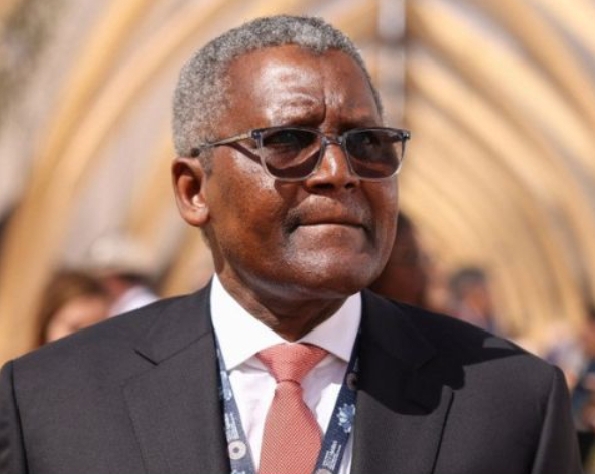Maritime
Nigeria’s Unified Energy Security Strategy: The Tantita Story

In the heart of Nigeria’s oil-rich Niger Delta, a quiet revolution is underway. It’s not being led by oil majors or government regulators—but by a security outfit with deep roots in the region and a bold mission to reclaim Nigeria’s crude oil lifeline from the grip of theft and sabotage.

Tompolo, Chairman of Tantita
That outfit is Tantita Security Services Nigeria Limited (TSSNL), and its impact is reshaping the nation’s energy narrative. This article is therefore the story of Tantita’s involvement in the current success story of national security arrangement as a non state player. As part of the guardians of the pipelines, this speccial report highlights Tantita’s overall role as part of the national network powering Nigeria’s oil comeback bid to reclaim its position as a major player in the international fuel supply chain, both within Organisation of Petroleum Exporting Countries (OPEC) and beyond.
A close observer of this patriotic indigenous maritime security company, our editor, Eguono Odjegba, takes a look at Tantita’s striking efforts that has continue to compliment the roles of state regulators and the national security apparatus and its ripple effects on the nation.
From Crisis to Control: The Tantita Turnaround
For years, Nigeria’s oil production was crippled by rampant pipeline vandalism and crude theft, costing the country billions in lost revenue and investor confidence. In 2022, the federal government awarded Tantita a pipeline surveillance contract, tasking the firm led by High Chief Government Ekpemupolo (aka Tompolo) -with restoring order to the chaos.
The results have been anything but impressive, bold and staggering. From inception until date over 702 illegal connection points and 1,784 illicit refinery sites have been uncovered.

Aliko Dangote, President Dangote Group
Available records show that oil theft dropped by 79% between 2022 and 2023, while key pipelines returned to full operational status for the first time in years. Interestingly, Tantita’s grassroots engagement strategy leveraging local knowledge and community trust, proved more effective than conventional enforcement. For successive governments inclined to genuine desires to sustain the ray of hope, Tantita’s success also became a PPP blueprint for securing Nigeria’s energy infrastructure.
Eyes in the Sky: Drone Surveillance Takes Flight
In 2025, Tantita took its operations to new heights—literally—with the deployment of fixed-wing hybrid VTOL drones. These advanced surveillance tools offer additional channel in monitoring and surveillance capability.
It includes real-time aerial monitoring of pipelines and oil communities, rapid response capabilities in rugged terrain, and early detection of leaks and sabotage, reducing environmental damage.
This tech-forward approach complements Tantita’s boots-on-the-ground vigilance, creating a multi-layered defense system that’s both proactive and precise.
Economic Ripple Effects: From Oil Fields to National Revenue
It bears repeating that Tantita’s interventions have had a direct impact on Nigeria’s economic recovery. Crude production rose to 1.8 million barrels/day (mbpd) in July 2025, surpassing the OPEC quota of 1.5 mbpd.
The Nigerian National Petroleum Company Limited (NNPCL) reported a ₦905 billion profit after tax in June 2025. Some of the ripple effects is that investors confidence rebounded, with upstream investments and strategic divestments empowering indigenous firms.
These gains are not just numbers—they represent restored credibility, increased foreign exchange earnings, and a more stable fiscal outlook for Nigeria, as recently attested to by Tony Elumelu, one of Nigeria’s brightest entrepreneurs with stakes in the oil and gas sector; and chairman of the United Bank of Africa (UBA).
Strategic Alignment: Nigeria’s Energy Future
There is no gainsaying that Tantita’s work is a cornerstone in Nigeria’s broader energy strategy and outlook.

Dr. Warredi, Tantita Director, Ops & Technical
Based on recent statistics and forecasts Abuja is targeting a significant increase in crude oil production over the next few years with 1.7 million barrels/day (mbpd) projection for 2025 flowing from recovery from 2024 fluctuations.
By 2027, the country aims to hit 2.7 mbpd, supported by infrastructure like the Dangote Refinery and Nigeria LNG’s Train 7. This is against the backdrop of security improvements occasioned by Tantita’s drive acting as key incentives to freeing up crude for export and gas monetization.
These projections are supported by increased refining capacity, upstream investments, and strategic divestments and entry of indigenous players like Dangote Refinery, presently operating at 85% capacity, and which is reducing reliance on imports and freeing up crude for export.
Added to this is the Nigeria LNG’s Train 7 and new FLNG projects boosting gas monetization and freeing up crude for external markets. The Petroleum Host Communities Development Trust with Tantita’s strong partnership has been instrumental in reducing sabotage risks through local engagement.

All these efforts align with Nigeria’s goal to become a gas-powered economy by 2030, while maintaining its relevance in the global oil market during the energy transition.
Strategic Goals & Policy Alignment
Nigeria aims to position itself as a gas-powered economy by 2030, while optimizing crude oil extraction amid the ongoing global energy transition. Statistics show that Nigeria maintains crude oil reserve base of 37.28 billion barrels, giving her the capacity to meet long-term production targets. These efforts align with global decarbonization commitments while ensuring domestic energy security.

Ojulari, NNPCL GMD
In this wise, Tantita’s operations align with the Petroleum Industry Act (PIA) and national goals for transparency, sustainability, and local inclusion; devised in response to the then steady fall in crude production following a troubling rising incidents in crude smuggling activities and diversion; pipelines vandalism and progressive erosion in the nation’s balance of trade via crude-dollar fall in income.
The contract with Tantita undertaken by the Nigerian National Petroleum Corporation (NNPC) remains the most significant PPP and result orientated security arrangement up to date. Flowing from Tantita’s successes in stemming the hitherto prevailing ugly tide, relevant authorities are upbeat about economic projections based laid out, structured roadmaps.
For instance, the Nigerian Upstream Petroleum Regulatory Commission (NUPRC) aims to ramp up production to 3 mbpd in the medium term. This is significant and courtesy Tantita’s success story that has contributed in reducing the influence of oil theft cartels and improved national energy security.
Current Global Standing
Presently Nigeria’s ability to meet OPEC quotas strengthens its position within the oil-producing alliance and enhances its credibility on the global stage.
Challenges And Way Forward
Despite the progress so far, research findings nonetheless outlined certain risks factors that are remaining and which must not be dismissed. Some of these risks are actually routine economic challenges both local and international. At the local scene, while oil theft has greatly been degraded and reduced, factors incubating resurgence which are both political and economic must therefore be closely watched and locked down through deliberate effort to sustain the tempo already achieved by Tantita in collaboration with other state players.

NUPRC Boss
With Tantita’s continued vigilance and innovation, Nigeria is better equipped than ever to navigate these challenges.
On the global scene is efficient production cost compared to high production costs (averaging $48 per barrel) in Nigeria which threaten profitability, in addition to geopolitical tensions and market volatility which could disrupt demand. This is in addition to OPEC+ decisions and competition from other suppliers.
Potential Security Risks
It is instructive to recognize that despite the achievements aforementioned, oil theft and sabotage still pose threats to consistent output should there be a relapse in vigilance and official commitment to sustaining performance. But we have reasons to applaud the oil sector that is clearly on the recovery path, with present ambitious goals and the infrastructure to support them.
Reinforcement of Aerial Surveillance Capability
There are indications that Tantita is currently upgrading and expanding its cutting-edge drone surveillance system aimed at bolstering the protection of Nigeria’s oil and gas infrastructure.
It will be recalled that the security firm during a symposium in Lagos recently by the African Maritime Environment Sustainability Initiative (AFMESI) spoke about the necessity to be up to date with all that is required to be on top of the game, in order to sustain the peace and progress already recorded.

IGP Egbetokun
Tantita Executive Director, Operations and Technical Services at, Capt. Warredi Enisuoh, emphasized the importance of integrating advanced technology into Nigeria’s oil security framework.
While the current acquisition and upgrade promises an enhanced progress and recovery path to Nigeria’s ambitious crude-gas export goals under the President Ahmed Bola Tinubu’s Renewed Hope Agenda, Tantita’s complimentary role in national security shines forth like the rays of the rising sun in the morning.
Tantita’s commitment, focus and results to support the national security infrastructure aren’t perhaps, just about protecting pipelines but about protecting Nigeria’s future.
In a sector long plagued by instability, Tantita has become a symbol of resilience, reform, and results. And as the country marches toward its renewed production goals, the firm’s role will only grow more vital.




































